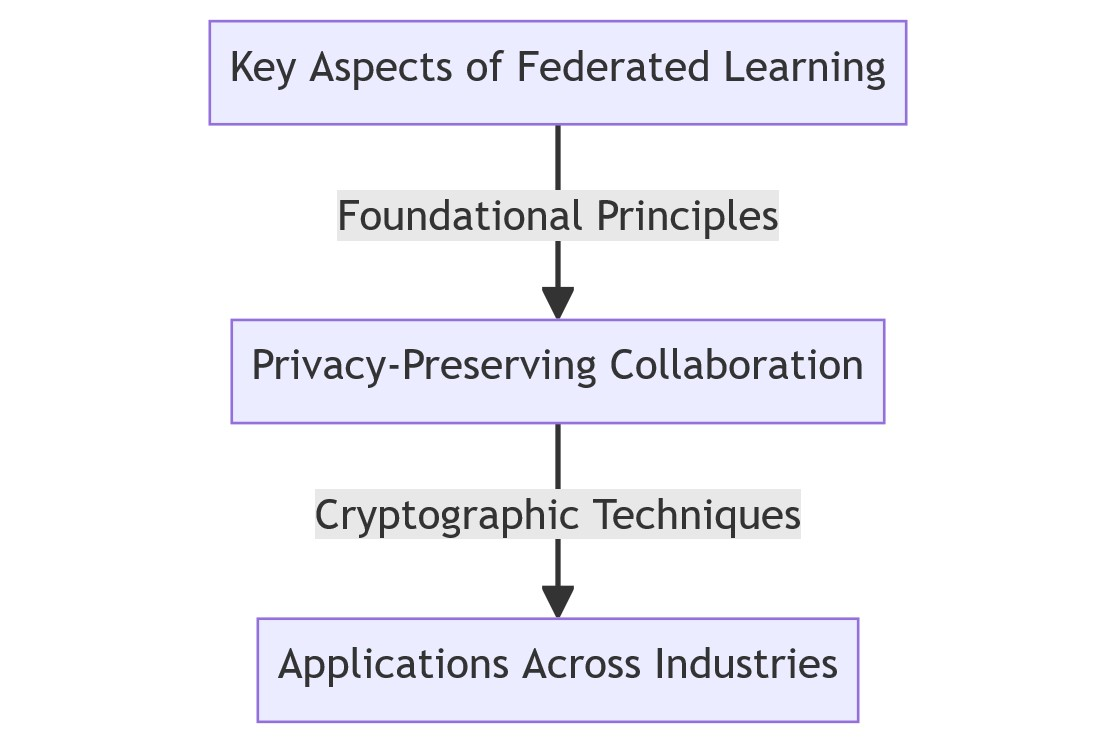By: Aiyaan Hasan, International Center for AI and Cyber Security Research and Innovations (CCRI), Asia University, Taiwan, rayhasan114@gmail.com
Abstract:
Federated Learning is a game-changing approach in the field of machine learning, providing a collaborative approach that enables model training across decentralized devices while protecting individual data privacy. This in-depth study explores the ideas, applications, problems, and future directions of Federated Learning. This investigation illustrates how Federated Learning emerges as a major factor in the growth of privacy-preserving, collaborative machine learning, from its core elements to real-world applications and the solutions resolving its obstacles.
Introduction:
The need for collaborative machine learning approaches that respect individual data privacy has grown critical in an era dominated by data-driven insights.[1] Federated Learning, with its decentralized model training technique, emerges as a game changer in this dilemma. This introduction lays the groundwork for understanding the complexities of Federated Learning, emphasizing its potential to transform how machine learning models are trained cooperatively across a network of remote devices while protecting sensitive data.[2]

Federated Learning’s Key Features:
Federated Learning’s founding principles serve as the foundation for its creative approach. It describes how the decentralized model training approach works, allowing machine learning models to gain insights from data sources scattered across devices without the need for raw data exchange. Federated Learning ushers in a new era of machine learning by encouraging collaborative learning without centralizing data.[3]
Collaboration for Privacy Protection:
Federated Learning is dedicated to protecting data privacy during the collaborative model update process. It looks into the cryptographic approaches used, such as federated averaging and differential privacy, to explain how they protect individual data while allowing for model improvement.[4] Federated Learning reduces concerns about data exposure by ensuring that sensitive information remains confidential, marking a significant development in privacy-preserving collaboration.
Applications in a Variety of Industries:
Federated Learning’s adaptability is demonstrated by its applications in a variety of industries. Federated Learning provides customized solutions for a variety of industries, including healthcare, where patient data confidentiality is critical, and financial institutions dealing with collaborative fraud detection. Real-world examples demonstrate how this strategy handles industry-specific difficulties while encouraging collaborative intelligence without compromising data ownership.
Innovations and Challenges:
Federated Learning represents an approach to change, but it is not without obstacles. Significant challenges include communication overhead, non-IID (non-identically distributed) data distributions, and the possibility of model poisoning assaults. It delves into ongoing technologies, such as secure aggregation protocols and advancements in federated optimization approaches, aimed at overcoming these obstacles. We obtain insights into how Federated Learning continues to improve, becoming more efficient and safer, by diving into the Complexities of these advances.
Conclusion:
Finally, Federated Learning emerges as an example in the collaborative machine learning environment, combining the requirement for collective intelligence with the need of individual data privacy. This detailed analysis of Federated Learning highlights its transformational impact by mapping the essential characteristics, applications, problems, and developments. As Federated Learning expands into new markets, its impact on sectors and the broader machine learning environment is expected to grow. This article summarizes Federated Learning’s path, from its core concepts to its future trajectories as it becomes a cornerstone in the evolution of privacy-preserving, collaborative intelligence.
References:
- Sheller, M. J., Edwards, B., Reina, G. A., Martin, J., Pati, S., Kotrotsou, A., … & Bakas, S. (2020). Federated learning in medicine: facilitating multi-institutional collaborations without sharing patient data. Scientific reports, 10(1), 12598.
- Li, Q., Wen, Z., Wu, Z., Hu, S., Wang, N., Li, Y., … & He, B. (2021). A survey on federated learning systems: Vision, hype and reality for data privacy and protection. IEEE Transactions on Knowledge and Data Engineering.
- Che, L., Wang, J., Zhou, Y., & Ma, F. (2023). Multimodal federated learning: A survey. Sensors, 23(15), 6986.
- Bogdanova, A., Nakai, A., Okada, Y., Imakura, A., & Sakurai, T. (2020). Federated learning system without model sharing through integration of dimensional reduced data representations. arXiv preprint arXiv:2011.06803.
- Almomani, A., Alauthman, M., Shatnawi, M. T., Alweshah, M., Alrosan, A., Alomoush, W., & Gupta, B. B. (2022). Phishing website detection with semantic features based on machine learning classifiers: a comparative study. International Journal on Semantic Web and Information Systems (IJSWIS), 18(1), 1-24.
- Lu, J., Shen, J., Vijayakumar, P., & Gupta, B. B. (2021). Blockchain-based secure data storage protocol for sensors in the industrial internet of things. IEEE Transactions on Industrial Informatics, 18(8), 5422-5431.
- Singh, A., & Gupta, B. B. (2022). Distributed denial-of-service (DDoS) attacks and defense mechanisms in various web-enabled computing platforms: issues, challenges, and future research directions. International Journal on Semantic Web and Information Systems (IJSWIS), 18(1), 1-43.
Cite As
Hasan A. (2023) Empowering Collaboration in Data Privacy: Exploring Federated Learning Learning and Artificial Intelligence in Cybersecurity, Insights2Techinfo, pp.1